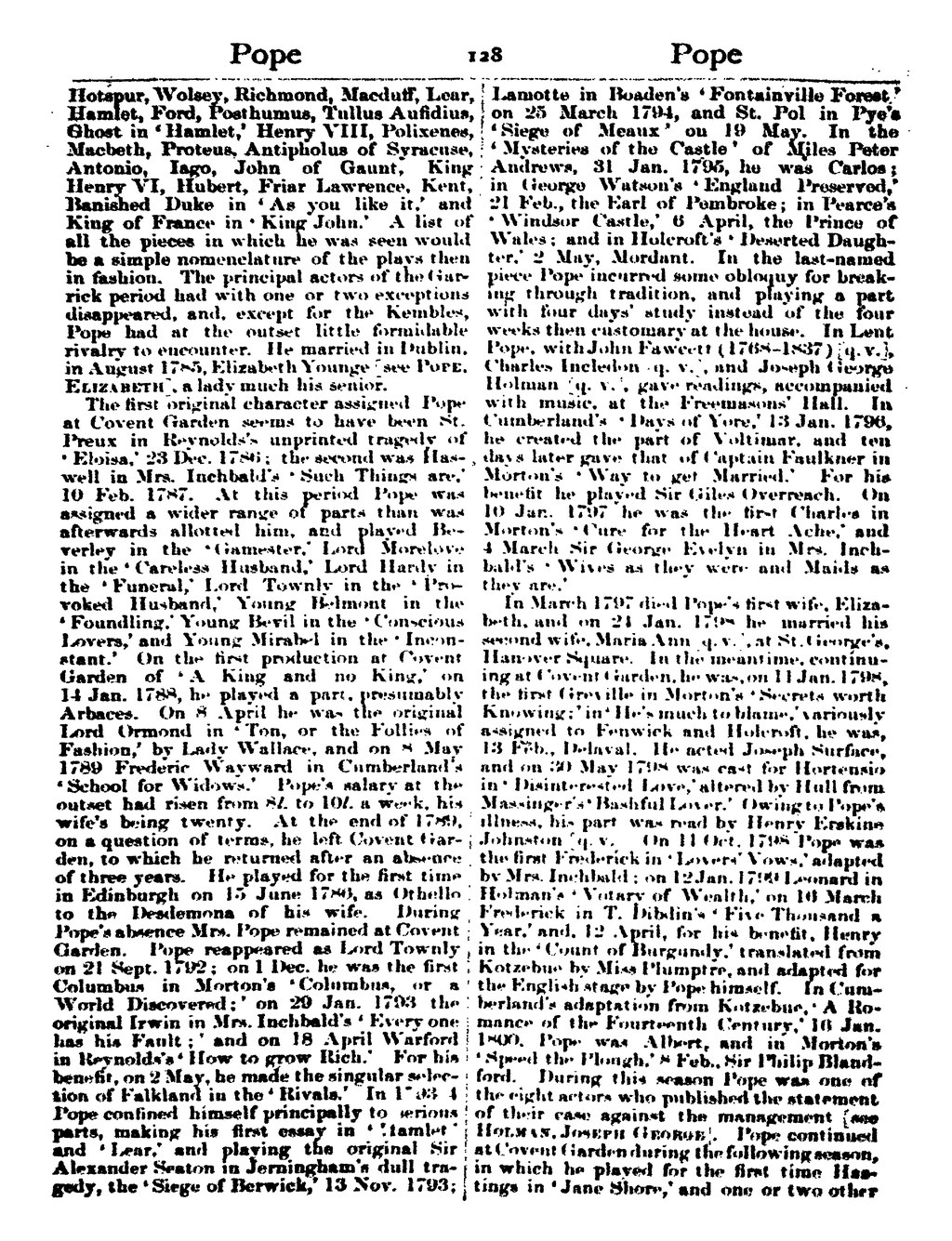Hotspur, Wolsey, Richmond, Macduff, Lear, Hamlet, Ford, Posthumus, Tullus Aufidius, Ghost in ‘Hamlet,’ Henry VIII, Polixenes, Macbeth, Proteus, Antipholus of Syracuse, Antonio, Iago, John of Gaunt, King Henry VI, Hubert, Friar Lawrence, Kent, Banished Duke in ‘As you like it,’ and King of France in ‘King John.’ A list of all the pieces in which he was seen would be a simple nomenclature of the plays then in fashion. The principal actors of the Garrick period had with one or two exceptions disappeared, and, except for the Kembles, Pope had at the outset little formidable rivalry to encounter. He married in Dublin, in August 1785, Elizabeth Younge [see Pope, Elizabeth], a lady much his senior.
The first original character assigned Pope at Covent Garden seems to have been St. Preux in Reynolds's unprinted tragedy of ‘Eloisa,’ 23 Dec. 1786; the second was Haswell in Mrs. Inchbald's ‘Such Things are,’ 10 Feb. 1787. At this period Pope was assigned a wider range of parts than was afterwards allotted him, and played Beverley in the ‘Gamester,’ Lord Morelove in the ‘Careless Husband,’ Lord Hardy in the ‘Funeral,’ Lord Townly in the ‘Provoked Husband,’ Young Belmont in the ‘Foundling,’ Young Bevil in the ‘Conscious Lovers,’ and Young Mirabel in the ‘Inconstant.’ On the first production at Covent Garden of ‘A King and no King,’ on 14 Jan. 1788, he played a part, presumably Arbaces. On 8 April he was the original Lord Ormond in ‘Ton, or the Follies of Fashion,’ by Lady Wallace, and on 8 May 1789 Frederic Wayward in Cumberland's ‘School for Widows.’ Pope's salary at the outset had risen from 8l. to 10l. a week, his wife's being twenty. At the end of 1789, on a question of terms, he left Covent Garden, to which he returned after an absence of three years. He played for the first time in Edinburgh on 15 June 1786, as Othello to the Desdemona of his wife. During Pope's absence Mrs. Pope remained at Covent Garden. Pope reappeared as Lord Townly on 21 Sept. 1792; on 1 Dec. he was the first Columbus in Morton's ‘Columbus, or a World Discovered;’ on 29 Jan. 1793 the original Irwin in Mrs. Inchbald's ‘Every one has his Fault;’ and on 18 April Warford in Reynolds's ‘How to grow Rich.’ For his benefit, on 2 May, he made the singular selection of Falkland in the ‘Rivals.’ In 1793–4 Pope confined himself principally to serious parts, making his first essay in ‘Hamlet’ and ‘Lear,’ and playing the original Sir Alexander Seaton in Jerningham's dull tragedy, the ‘Siege of Berwick,’ 13 Nov. 1793; Lamotte in Boaden's ‘Fontainville Forest’ on 25 March 1794, and St. Pol in Pye's ‘Siege of Meaux’ on 19 May. In the ‘Mysteries of the Castle’ of Miles Peter Andrews, 31 Jan. 1795, he was Carlos; in George Watson's ‘England Preserved,’ 21 Feb., the Earl of Pembroke; in Pearce's ‘Windsor Castle,’ 6 April, the Prince of Wales; and in Holcroft's ‘Deserted Daughter,’ 2 May, Mordant. In the last-named piece Pope incurred some obloquy for breaking through tradition, and playing a part with four days' study instead of the four weeks then customary at the house. In Lent Pope, with John Fawcett (1768–1837) [q. v.], Charles Incledon [q. v.], and Joseph George Holman [q. v.], gave readings, accompanied with music, at the Freemasons' Hall. In Cumberland's ‘Days of Yore,’ 13 Jan. 1796, he created the part of Voltimar, and ten days later gave that of Captain Faulkner in Morton's ‘Way to get Married.’ For his benefit he played Sir Giles Overreach. On 10 Jan. 1797 he was the first Charles in Morton's ‘Cure for the Heart Ache,’ and 4 March Sir George Evelyn in Mrs. Inchbald's ‘Wives as they were and Maids as they are.’
In March 1797 died Pope's first wife, Elizabeth, and on 24 Jan. 1798 he married his second wife, Maria Ann [q. v.], at St. George's, Hanover Square. In the meantime, continuing at Covent Garden, he was, on 11 Jan. 1798, the first Greville in Morton's ‘Secrets worth Knowing;’ in ‘He's much to blame,’ variously assigned to Fenwick and Holcroft, he was, 13 Feb., Delaval. He acted Joseph Surface, and on 30 May 1798 was cast for Hortensio in ‘Disinterested Love,’ altered by Hull from Massinger's ‘Bashful Lover.’ Owing to Pope's illness, his part was read by Henry Erskine Johnston [q. v.] On 11 Oct. 1798 Pope was the first Frederick in ‘Lovers' Vows,’ adapted by Mrs. Inchbald; on 12 Jan. 1799 Leonard in Holman's ‘Votary of Wealth,’ on 16 March Frederick in T. Dibdin's ‘Five Thousand a Year,’ and, 12 April, for his benefit, Henry in the ‘Count of Burgundy,’ translated from Kotzebue by Miss Plumptre, and adapted for the English stage by Pope himself. In Cumberland's adaptation from Kotzebue, ‘A Romance of the Fourteenth Century,’ 16 Jan. 1800, Pope was Albert, and in Morton's ‘Speed the Plough,’ 8 Feb., Sir Philip Blandford. During this season Pope was one of the eight actors who published the statement of their case against the management [see Holman, Joseph George]. Pope continued at Covent Garden during the following season, in which he played for the first time Hastings in ‘Jane Shore,’ and one or two other
